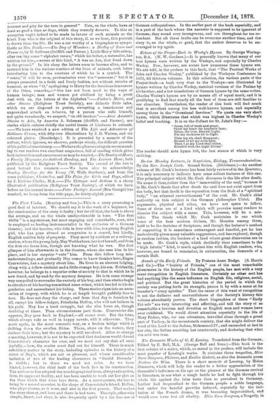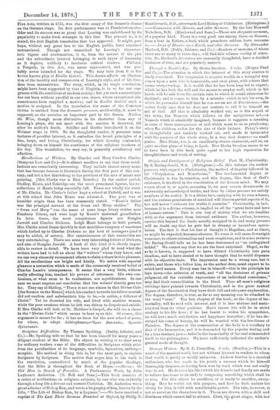The Dramatic Works of G. E. Lessing. Translated from the
German. Edited by E. Bell, M.A. (George Bell and Sons.)—This book is the first volume of a series, which, as stated in the preface, will include the most popular of Lessing's works. It contains three tragedies, Miss Sara Sampson, Phi lotas, and Emilia Galotti, as also the dramatic poem Nathan the tVise. There is a short memoir of Leasing, by Helen Zimmorn, which will help the reader to a better appreciation of the dramatist's influence on his age as the pioneer of the German revival in literature, to see what a tough battle he had to fight through his whole life against the false taste then so prevalent in Germany. Luther had bequeathed to the German people a noble language, but under the baneful growths induced, especially by the imi- tation of the French drama, it was becoming impoverished, and would soon have lost all vitality. Miss Sara Sampson, a Tragedy, in Five Acts, written in l75.5, was the first essay of the domestic drama on the German stage. Its first performance was at Frankfort-on-the- Oder and its success was so great that Leasing was emboldened by its popularity to make fresh attempts in this line. The present is, it is stated, the first English translation that has appeared. It might, per- haps, without any great loss to the English public, have remained nntranslated. Though not unmarked by Lessing's character- istic vigour and condensation, it is, from the nature of the plot and the subordinate interest belonging to such types of humanity as it depicts, unlikely to fascinate critical readers. Pdilotas, a Tragedy, in One Act, was never represented, and was pro- bably never intended for the stage. We may turn from it to the better known play of Emilia Gaiota. This drama affords an illustra- tion of the lucidity and compression of Lessing's style, and of his free- dom from mannerisms. The story, which, in its tragic conclusion, might have been suggested by that of Virginia, is in so far not con- gruous with the conditions of modern society ; but yet such a catastrophe has not been without parallel in our own times, where exceptional cir- cumstances have supplied a motive ; and in Emilia Galvtli such a motive is assigned. In the translation the name of tho Countess Grains is omitted from the dramatis persome, accidentally, it must be supposed, as she sustains an important part in the drama. Nathan the Wise, though more distinctive in its character than any of Lessing's plays, did not meet with the success it deserved, till after its author's death. Schiller and Goethe introduced it on the Weimar stage in 1801. To the thoughtful reader, it presents some features of peculiar interest, as it embodies the broad principles of a fine, large, and loving Christianity, for which Leasing contended, bringing down on himself the anathemas of the religious teachers of his day. The translation, we may say, is generally satisfactory and effective.







































 Previous page
Previous page